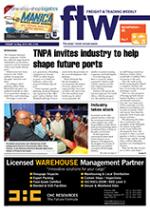Growing cities in
South Africa and
the rest of the
world present
opportunities for logistics
companies to provide
4PL services to shippers,
according to a
Frost & Sullivan
report.
“Urban
Logistics for
the most part
is concerned
with last leg of
the product lifecycle – last
mile deliveries,” says senior
analyst and researcher
Archana Vidyasekar.
The urban supply chain
mainly delivers what are
essentially finished goods
within cities.
Specialist logistics
companies will be needed to
store and deliver goods in the
complex urban environment
because every city is unique,
and there are no one-sizefits-
all solutions.
“Finished goods” could
range from raw materials
for construction
companies in
urban areas to
finished products
to retailers.
“Disruptive”
technologies such
as 3-D printing
and online purchasing
combined with increasing
congestion on the roads and
rising fuel prices are forcing
shippers to outsource their
logistics.
As a result, there is
a growing demand for
companies that can store
and consolidate loads in
order to distribute them
more efficiently.
4PL adds
value by
sourcing
components
or ingredients
from different
suppliers,
assembling
or packaging
them, storing
the finished
product and
distributing
it to the
consumer,
factory line,
shop or
building site when required.
Services can include
smaller inner-city
warehouses, which are
stocked during off-peak
traffic times.
When the roads are
busy the logistics company
can still deliver goods on
demand.
Frost & Sullivan estimates
that 30-35% of logistics
is already
outsourced in
urban regions
around the
world.
“This will
grow to over
50% of the
spending
in 2020 as
logistics
providers
find methods
to organise the unorganised
supply chain and as logistics
evolves into more of a 4PL
concept,” she says.
INSERT
Their is a growing
demand for
companies that can
store and consolidate
loads in order to
distribute them more
efficiently.

